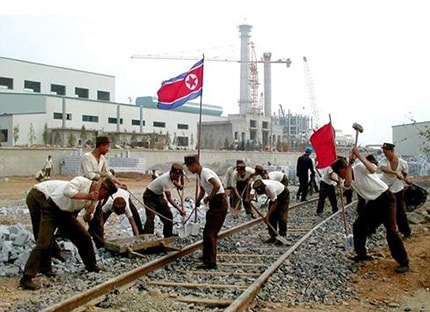Aside from Trump and Kim’s Meet, Mongolia’s North Korea Relations Remain Robust


The North Korean Embassy, Ulaan Baatar
Among talk of the potential Trump-Kim summit taking place in Mongolia (other likely candidates include the Korean DMZ and Singapore), not much attention has been paid to the relations the two countries have. In fact, Mongolia is just about the only country in the world to maintain good relations with the US and North Korea, and has long been used as a quiet and secret venue to host unofficial talks between the two, although never at the presidential level. Transport connectivity between Ulaan Baatar and Pyongyang is well established, either by train or via air.
Whether or not the summit takes place in Mongolia, relations between these two nearby northeast Asian countries are dynamic and interesting. While Mongolia is a signatory to China’s Belt and Road Initiative, North Korea is not; should its denuclearisation occur and a peace treaty with South Korea signed, Beijing will be hopeful of getting Pyongyang on board.
In fact, Mongolian-North Korean trade hit a record high last year, according to figures released by the Korea Trade-Investment Promotion Agency (KOTRA), which showed that trade between the two countries has increased by 43 percent to reach US$2.29 million. That’s a pretty small amount, but only includes direct trade. The increase was largely because of Mongolia’s exports to North Korea, which stood at US$1.92 million, up 55 percent from a year ago. During the same period, imports from North Korea increased by 2.1 percent to US$370,000. Tobacco was the most exported item from Mongolia to North Korea, accounting for 92.2 per cent of the total.
These are small figures in the grand scheme of things, but of significance to a country such as North Korea. Other, off-balance sheet items that do not appear in these figures are the income from the North Korean restaurants operated by the North Korean Embassy in Ulaan Baatar (and well worth a visit for some authentic DPRK food, drink, and entertainment) and the thousands of unofficially present North Korean workers who are engaged on numerous building sites in Mongolia, including in the capital city. Yes, even Mongolia sub-contracts its labor to poorer nations.
Although the sanctions imposed by the United States have been noted by Mongolia, not wanting to get into Washington’s bad books, has been sending some of the DPRK workers home. Prior to last year’s wave of sanctions, Ulaan Baatar and Pyongyang had agreed allow 5,300 North Koreans to work on construction sites in Mongolia over the coming five years. But from a high of more than 2,100 in 2013, Mongolia began dealing with an economic crisis, in part caused by China’s slowdown. Construction projects were halted, and as of November 2017, just 1,200 North Koreans were employed in Mongolia. That number is set to fall further – unless sanctions are relaxed.
Construction firms prefer to hire North Koreans because they work long hours for little money. Operating in a similar fashion to Chinese migrant workers, their North Korean handlers also forbid them from leaving the construction sites, where they also sleep and eat. However, they remain popular, enduring poor living conditions, low pay, and being both subservient and skilled. They are constantly motivated by the playing of North Korean tunes, songs and having the DPRK flag flown on site.

North Korean Construction team, Russia
Curiously, if Trump and Kim manage to come to a meaningful agreement, North Korean workers, managed by the state, could become a sought-after commodity along the Belt and Road. Obedient, able to accept poor conditions and low pay, with part of their income being swallowed by the government, it is possible that North Korean labor could be the cost-effective, well-trained, and disciplined work force to deploy along Chinese, Mongolian, and Russian sections of the Belt and Road. There are an estimated 50,000 North Korean workers overseas, with an interesting interactive map here showing where they are. Even parts of the EU utilize North Korean expatriate labor.
Sanctions-busting results of the Trump-Kim talks could see the recruitment of DPRK workers become, for a time at least, an increasing employment trend along the Belt and Road’s Far Eastern corridors, and add relief to Pyongyang’s long starved coffers. The same is also true of labor intensive industries such as textiles and agriculture. These are already extant in Pyongyang, where massive factories engage in finishing work such as button and hem sewing, and vegetable washing and packing. If sanctions come to an end, there may be opportunities for foreign investors to relocate part of their production process to the DPRK, or hire their workers in factories elsewhere in northeast Asia to facilitate such work. Higher standards and pay will no doubt be requested, but not enough to make them uncompetitive. Executives familiar with Asian HR issues should be keeping a keen eye on developments.
About Us
Silk Road Briefing is produced by Dezan Shira & Associates. The firm provides business intelligence, investment advisory, due diligence, tax advisory, corporate establishment and structuring, accounting, payroll and related professional services throughout Asia and has business experience dealing with both Mongolia and North Korea. To contact us please email silkroad@dezshira.com or visit us at www.dezshira.com
 Related Reading:
Related Reading:
![]() Getting North Korea into China’s Belt and Road Initiative
Getting North Korea into China’s Belt and Road Initiative
DPRK Business Monthly: April 2018
This regular publication looks at current international, domestic, and peninsular affairs concerning North Korea while also offering commentary and tourism information on the country.
Silk Road and OBOR Business Intelligence
Dezan Shira & Associates´ Silk Road and OBOR investment brochure offers an introduction to the region and an overview of the services provided by the firm. It is Dezan Shira´s mission to guide investors through the Silk Road´s complex regulatory environment and assist with all aspects of establishing, maintaining and growing business operations in the region.







